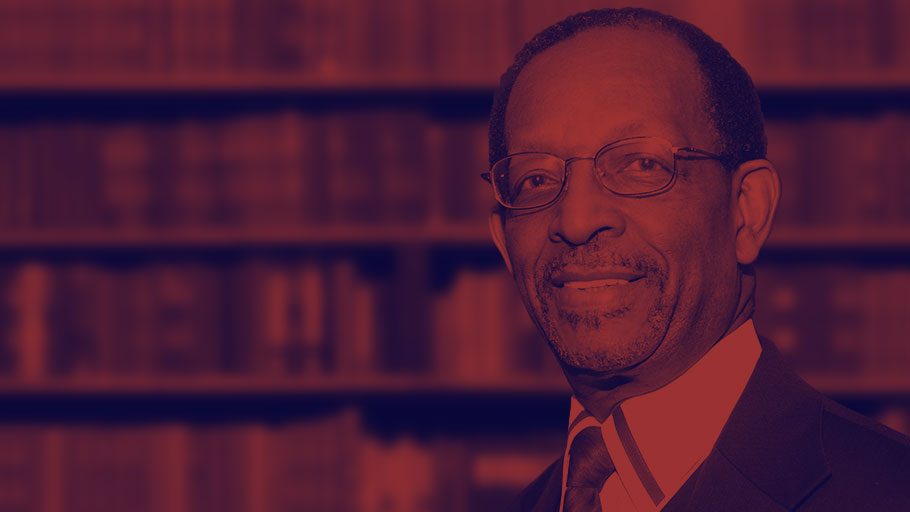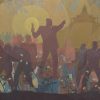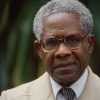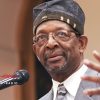It’s Nation Time
The 40th Anniversary of the Gary National Black Political Convention
[For publication the week of March 26, 2012]
March 10-12, 1972, an estimated 10,000 Black people converged on a small steel town in Indiana for one of the greatest gatherings in the history of Africans in America – the Gary National Black Political Convention. As I reflect on more than a half century on the frontlines of the Black Freedom Struggle, anyone who is intimately familiar with my work is aware that the Gary Black Political Convention was one of the defining moments for an emerging social/political activist from Youngstown, Ohio. March 23rd the Institute of the Black World 21st Century convened a National Symposium entitled It’s Nation Time in the Rayburn House Office Building on Capitol Hill in Washington, D.C. to mark the occasion. The goal of the Gary Convention was to adopt a National Black Political Agenda reflecting the interests of African Americans as a tool to run and/or endorse candidates for elective office. Devising a Black Agenda was seen as integral to holding candidates, who would seek Black votes, accountable to the interests and aspirations of Black people. Moreover, as the Preamble to the National Black Political Agenda adopted at Gary suggests, there was also an effort to encourage Africans in America to view ourselves as an independent, progressive force in the forefront of the struggle to create a more just and humane society.
The Gary Convention emerged after a decade of tumultuous and significant events in the Black Freedom Struggle. In August of 1963 major civil rights leaders, with the support of key allies in organized labor, organized the historic March on Washington – which provided the impetus for the Congress of the United States to pass the milestone Civil Rights Act of 1964. The Voter Rights Act of 1965 was signed into law by Lyndon B. Johnson after “Bloody Sunday” in Selma and the subsequent Selma to Montgomery March. 1968 witnessed the election of Carl B. Stokes in Cleveland, Ohio and Richard G. Hatcher in Gary, Indiana as the first Black mayors of major northern cities.
This period was also marked by the eruption of massive rebellions in urban centers like Los Angeles, Newark and Detroit and the reverberation of “Black Power” as a battle cry encapsulating the demands of Black poor and working people and dispossessed young people for economic justice and an end to police brutality and misconduct in America’s “dark ghettos.” Black Power spawned a new found “black consciousness” which included positive identification with Africa and Black Nationalism which rejected “Integrationism” in favor of the building of independent Black institutions, community control of places and spaces where Blacks were in the majority – Black control of the Black community. This Nationalist fervor and its growing support among increasing numbers of Black people put the leaders of mainstream civil rights organizations like the NAACP, Urban League and Congress of Racial Equality on the defensive as insurgent leaders excoriated them and their supporters as Uncle Toms, Handkerchief Heads and Oreos (Black on the outside and White on the inside). The internecine ideological warfare was brutal, reminiscent of the debilitating feuds between W.E.B. DuBois and Booker T. Washington and Marcus Garvey and Dubois.
By 1970 Black America stood at a critical crossroads in terms of the debate/divisions/tensions between Integrationism and Nationalism and the role of electoral politics in addressing the needs of Black people, particularly Black poor and working people. It was in 1970 that a major meeting was convened which would begin to bridge the ideological divides between various ideological tendencies and organizations in the Black community and set the stage for one of the most momentous events of the 20th century. Under the leadership of poet-playwright, political activist Imamu Amiri Baraka, the Committee for a Unified Newark (CFUN) and other leading Nationalist/Pan Africanist activists, a Congress of African People was convened in Atlanta, Georgia. Seeking to attract a broad spectrum of political tendencies to attend the Congress, Baraka and his allies promoted the idea of operational unity or “unity without uniformity” as a principle that would enable ideologically diverse organizations and leaders to attend/participate. As a result, CAP 70, as it came to be known, attracted everyone from the Nation of Islam’s emerging charismatic leader Minister Louis Farrakhan, to Nationalist/Pan-Africanists Owusu Sadaukai of Malcolm X Liberation University and Nelson Johnson of the Student Organization for Black Unity to Whitney Young, President/CEO, of the moderate, mainstream National Urban League. It was an amazing meeting. The display of unity after years of ideological warfare was a welcome relief. I recall Lerone Bennett, Jr., Senior Editor of Ebony Magazine, expressing utter exhilaration that Black people seemed to be finally getting their act together.
Participants came from all across the world including a delegation of Aborigines from Australia. But, perhaps the most important outcome of CAP ’70 was that it set the stage for the National Black Political Convention in Gary. Fresh off the success of pulling together diverse political tendencies and leaders together in Atlanta, Baraka proposed the convening of a National Black Political Convention to devise a Black Political Agenda and galvanize Africans in America to advance Black interests and fight for fundamental change in the American body-politic. Mayor Richard Hatcher of Gary and Congressman Charles C. Diggs of Detroit, a leading Black voice on Africa issues in Congress, agreed to serve as Co-Conveners of this extraordinary enterprise. Baraka insisted that the model of tripartite Conveners be replicated throughout the organizing process with the provision that there be at least one elected official and one Nationalist or activist as part of the leadership team at the Congressional District and State levels. In one of the most incredible organizing processes I have experienced, Black folks met Congressional District by Congressional District and state by state all across this country to elect delegates and observers to the Convention and to discuss/debate resolutions for incorporation into a National Black Political Agenda. The level of interest and enthusiasm was off the charts. Black people were going to have their own Convention and release a Black Political Agenda to the United States and the World. It was all done in less than six months. There has never been anything like it before or since!
The who’s who of Black America from Civil Rights/Human Rights leaders, elected officials, Nationalists/Pan Africanists, business leaders, artists and entertainers gathered in Gary — Rev. Jesse L. Jackson, Congressman Walter Fauntroy, Queen Mother Audley Moore, Owusu Sadaukai, Betty Shabazz, Coretta Scott King, Congressman John Conyers, Dick Gregory, Richard Roundtree, Isaac Hayes, Nikki Giovanni … but most importantly thousands of ordinary people from all walks of life from Black America. It was a magnificent sight to behold all these beautiful Black people together in one place charting a path for the future of Africans in America and the world.
The Convention was not without its tensions and controversies. Resolutions within the Agenda calling for “community control of education” and less emphasis on bussing to achieve “integration” and another that essentially demanded that Israel revert to a secular state called Palestine with the right of return of displaced Palestinians sent shock waves through the ranks of the more moderate organizations and leaders, many of whom quickly rushed to the mainstream media to disavow these positions in the document. There was also disagreement over whether to call for a “Black Political Party” as Rev. Jesse Jackson and Mayor Hatcher had hinted during speeches to the Convention. Nationalists/Pan Africanists were fully supportive of the idea of a Black Party, but most elected officials were fiercely resistant. The compromise was the creation of a National Black Political Assembly as the continuations mechanism for the Convention with Baraka, Hatcher and Diggs continuing in their roles as the tripartite leadership.
Controversies notwithstanding, thousands of Black people left Gary energized and committed to making electoral politics a more relevant/meaningful exercise to promote Black interests. And, by the end of the decade the number of Black elected officials had quadrupled. Some activists translated the experience of Gary into the creation of Black oriented organizations like the Coalition of Black Trade Unionists, National Caucus of Black State Legislators and National Conference of Black Local Elected Officials. But for me, the most important contributions were two cardinal concepts: First, the audacity of Black people to envision a process for formulating Black Agendas to promote and defend Black interests and to hold candidates accountable to same. Second, the audacity of Black people to offer an analysis of the flaws/failings of America’s Capitalist political-economy and assume responsibility for being in the “vanguard” of the struggle for a “new society.”
IBW convened the Symposium to commemorate the 40th Anniversary of the Gary National Black Political Convention not out of a sense of historical nostalgia but a conviction that the concept of political processes to develop Black Agendas to run or endorse candidates for office is as essential today as it was in 1972. It is for this reason that IBW developed the Shirley Chisholm Presidential Accountability Commission. Its mission is to measure the impact of the policies of presidential administrations in relationship to broadly defined areas of need and interest in Black America and the Pan African world. The “State of Emergency in Black America” clearly suggests the critical need of Black people to press for policies which will resolve the crises we face no matter the political party or complexion of the person who occupies the White House. We must not only commemorate Gary but seek to recapture and re-propagate the concept of coming together community by community, Congressional District by Congressional District to discuss issues of vital concern to Black people and utilize Black Agendas to advance and defend Black interests.
Finally, we must commemorate and study Gary because the analyses of the systems of society put forth forty years ago still resonate and are relevant today: “Our cities are crime-haunted dying grounds. Huge sectors of our youth – and countless others – face permanent unemployment … neither the courts nor the prisons contribute anything resembling justice or reformation. The schools are unable – or unwilling – to educate our children for the real world of our struggles. Meanwhile, the officially approved epidemic of drugs threatens to wipe out the minds and strengths of our best young warriors.” Therefore … “Black politics …must accept the major responsibility for creating both the atmosphere and the program for far-ranging change in America. Such a responsibility is ours because it is our people who are most deeply ravished by the present systems of society…. It is the challenge to consolidate and organize our own Black role as the vanguard in the struggle for a new society.” As IBW gears up for State of the Black World Conference III, November 14-18, in Washington, D.C. following the presidential election, we hope that the spirit of Gary will pervade the proceedings and inspire the participants to commit to a relentless struggle to heal Black families and communities. It’s Nation Time… again!
Dr. Ron Daniels is President of the Institute of the Black World 21st Century and Distinguished Lecturer at York College City University of New York. His articles and essays also appear on the IBW website www.ibw21.org and www.northstarnews.com . To send a message, arrange media interviews or speaking engagements, Dr. Daniels can be reached via email at info@ibw21.org
Note: Use this link http://www.youtube.com/user/IBW21st?feature=mhee to view the Symposium Commemorating the 40th Anniversary of the historic Gary National Black Political Convention.
















reading this in the wake of AmirBaraka’s death makes it even clearer that a new conference like this is needed